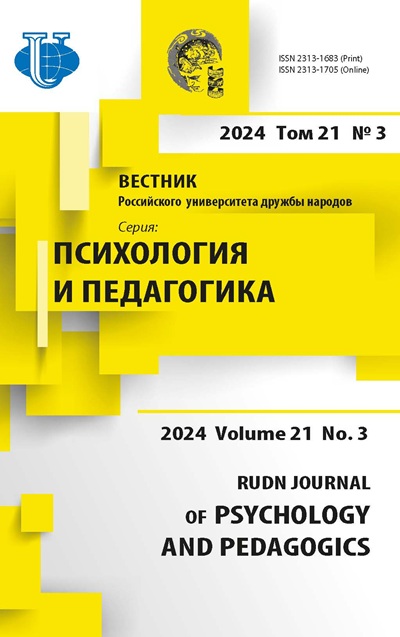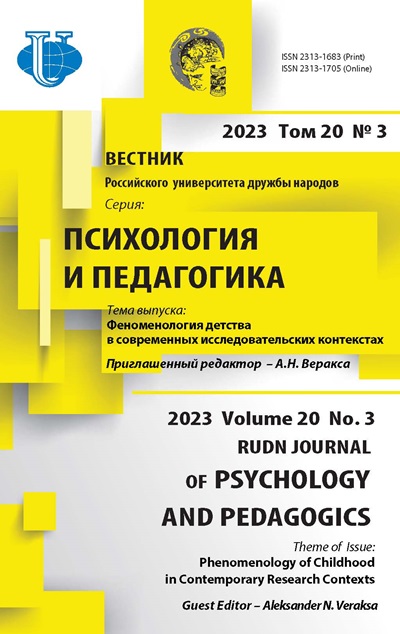Characteristics Motivation of Work in the Context of Work Engagement Among Preschool Teachers
- Authors: Rudnova N.A.1, Volkova E.N.1, Kornienko D.S.1
-
Affiliations:
- Psychological Institute of the Russian Academy of Education
- Issue: Vol 20, No 3 (2023): Phenomenology of Childhood in Contemporary Research Contexts
- Pages: 650-668
- Section: PROFESSIONAL AND PERSONAL CHARACTERISTICS OF EDUCATORS AND THEIR ROLE IN PERSONALITY DEVELOPMENT
- URL: https://journals.rudn.ru/psychology-pedagogics/article/view/36969
- DOI: https://doi.org/10.22363/2313-1683-2023-20-3-650-668
- EDN: https://elibrary.ru/ALCEFS
Cite item
Full Text
Abstract
Being a specific group of educators due to the specifics of the organization as well as the pedagogical and psychological content of their activities, preschool teachers show both similar and different characteristics in comparison with their peers from other educational institutions. At the same time, data on their work engagement, as well as on its connection with autonomous and controlled motivation, are scarce. The purpose of this study was to identify the connection between the professional motivation of the preschool teachers and their work engagement. The research involved 260 female participants ( M = 35.95, SD = 10.08), of whom 131 were preschool teachers and 129 made up a comparison group (the respondents were employed in different fields of activity). Data were collected using the Utrecht Work Engagement Scale (UWES) by W. Schaufeli and A. Bakker (adapted by D.A. Kutuzova) and the Professional Motivation Questionnaire by E.N. Osin et al. The results of the study confirmed the hypothesis of a positive relationship between autonomous professional motivation and work engagement, and a negative relationship between controlled motivation and work engagement. In addition, data were obtained on the significant predictive role of autonomous motivation for the level of work engagement. It was also found that the preschool teachers had higher rates of work engagement, as well as autonomous and controlled professional motivation, than the respondents of the comparison group. At the same time, in the group of the preschool teachers, with pronounced autonomous motivation, the effect of controlled motivation, which is negative for work engagement, disappears, which was not found in the comparison group. The age of the preschool teachers turned out to make a positive impact to their work engagement. As prospects for further research, it is proposed to involve teachers employed at different levels of the educational process (preschool, junior school, etc.), as well as to clarify the role of age and experience of the preschool teachers in their work engagement and professional motivation, since the available data are rather ambiguous.
About the authors
Natalia A. Rudnova
Psychological Institute of the Russian Academy of Education
Author for correspondence.
Email: rudnova.na@yandex.ru
ORCID iD: 0000-0003-2063-2892
SPIN-code: 2568-1314
PhD in Psychology, is Junior Research Fellow
9 Mokhovaya St, bldg 4, Moscow, 125009, Russian FederationElena N. Volkova
Psychological Institute of the Russian Academy of Education
Email: envolkova@yandex.ru
ORCID iD: 0000-0001-9667-4752
SPIN-code: 6932-2512
Doctor of Psychology, Professor, is Leading Researcher
9 Mokhovaya St, bldg 4, Moscow, 125009, Russian FederationDmitry S. Kornienko
Psychological Institute of the Russian Academy of Education
Email: dscorney@mail.ru
ORCID iD: 0000-0002-6597-264X
SPIN-code: 5115-4075
Senior Researcher
9 Mokhovaya St, bldg 4, Moscow, 125009, Russian FederationReferences
- Al-Ali, T., Akour, M.M., Al-Masri, E., Mizaghobian, A.A.H., & Ghaith, S. (2021). Psychological burnout among professionals working with children with motor disabilities. Psychology in Russia: State of the Art, 14(1), 69–85. https://doi.org/10.11621/pir.2021.0106
- Bazarov, T.Yu., Golynchik, E.O., Lipatov, S.A., & Nesmeianova, R.K. (2022). Change response styles and teachers' perceptions of organizational culture and conflicts in the school. Moscow University Psychology Bulletin, (3), 85‒118. (In Russ.) https://doi.org/10.11621/vsp.2022.03.06
- Belkina, V.N. (2001). Features of the professional activity of a preschool teacher within the framework of the humanistic paradigm. Yaroslavl Pedagogical Bulletin, (3‒4). (In Russ.) Retrieved April 12, 2023, from https://vestnik.yspu.org/releases/doskolnoe_obrazovanie/12_1/
- Belobrykina, O.A. (2010). Professional motivation: Concept, content, contradictions. Problems of Adaptation and Self-Realization of Personality in Modern Socio-Cultural Conditions: Conference Proceedings (pp. 218–225). Novosibirsk: Nemo-Press. (In Russ.)
- Belyakova, E.G., & Bykov, S.A. (2022). Meaningfulness of life and professional experience as predictors of professional self-determination of future teachers. National Psychological Journal, (4), 29–41. (In Russ.) https://doi.org/10.11621/npj.2022.0404
- Buraga, N.A. (2017). The role of the personal resources contributing to the maintenance of the work engagement among teachers. Doctor in Psychology Thesis. Chisinau: USM. (In Russ.)
- Csikszentmihalyi, M. (1990) Flow: Flow the psychology of optimal experience. New York: Harper & Row.
- Cuevas, R., Ntoumanis, N., Fernandez-Bustos, J.G., & Bartholomew, K. (2018). Does teacher evaluation based on student performance predict motivation, well-being, and ill-being? Journal of School Psychology, 68, 154–162. https://doi.org/10.1016/j.jsp.2018.03.005
- Deci, E.L., & Ryan, R.M. (2008). Self-determination theory: a macrotheory of human motivation, development, and health. Canadian Psychology/Psychologie Canadienne, 49(3), 182–185. https://doi.org/10.1037/a0012801
- Di Stefano, G., & Gaudiino, M. (2018). Differential effects of workaholism and work engagement on the interference between life and work domains. Europe’s Journal of Psychology, 14(4), 863–879. https://doi.org/10.5964/ejop.v14i4.1626
- Dunaevskaja, Je.B. (2009). Motivation for professional and personal development and self-development of a teacher as a psychological and pedagogical problem. Educational Psychology in Polycultural Space, 2(3–4), 77–83. (In Russ.)
- Engdahl, I., Pramling Samuelsson, I., & Ärlemalm-Hagsér, E. (2021). Swedish teachers in the process of implementing education for sustainability in early childhood education. New Ideas in Child and Educational Psychology, 1(1), 3–23. https://doi.org/10.11621/nicep.2021.0101
- Fernet, C., Chanal, J., & Guay, F. (2017). What fuels the fire: Jobor task-specific motivation (or both)? On the hierarchical and multidimensional nature of teacher motivation in relation to job burnout. Work & Stress, 31(2), 145–163. https://doi.org/10.1080/02678373.2017.1303758
- Gilmutdinova, L.R. (2017). Features of motivation of preschool teachers as one of the components of job satisfaction. Psychology ‒ the Science of the Future: Conference Proceedings (pp. 188–192). Moscow: Institute of Psychology of RAS. (In Russ.)
- Gordeeva, T.O. (2016). Motivation: New theoretical approaches, diagnostics and practical recommendations. Siberian Journal of Psychology, (62), 38–53. (In Russ.) https://doi.org/10.17223/17267080/62/4
- Granziera, H., & Perera, H.N. (2019). Relations among teachers’ self-efficacy beliefs, engagement, and work satisfaction: A social cognitive view. Contemporary Educational Psychology, 58, 75–84. https://doi.org/10.1016/j.cedpsych.2019.02.003
- Kondratyuk, N.G., & Morosanova, V.I. (2022). Regulatory resources for work engagement and overcoming professional deformations in the context of human well-being in the work environment. Russian Psychological Journal, 19(1), 143–157. (In Russ.) https://doi.org/10.21702/rpj.2022.1.11
- Kutuzova, D.A. (2006). Organization of activity and style of self-regulation as factors of professional burnout of a teacher-psychologist. Ph.D. in Psychology Thesis. Moscow: Psychological Institute of the Russian Academy of Education. (In Russ.)
- Li, J.-B., Leung, I.T.Y., & Li, Z. (2021). The pathways from self-control at school to performance at work among novice kindergarten teachers: The mediation of work engagement and work stress. Children and Youth Services Review, 121, 105881. https://doi.org/10.1016/j.childyouth.2020.105881
- Lobanova, T.N. (2022). Labor interests as a key factor in the involvement and performance of educational technology employees. National Psychological Journal, (4), 102–115. (In Russ.) https://doi.org/10.11621/npj.2022.0410
- Mandrikova, E.Ju. (2012). Engagement: A review of current research. Psihologija v Vuze, (6), 53–64. (In Russ.)
- Masari, G.-A., Muntele, D., & Curelaru, V. (2013). Motivation, work-stress and somatic symptoms of Romanian preschool and primary school teachers. Procedia ‒ Social and Behavioral Sciences, 84, 332–335. https://doi.org/10.1016/j.sbspro.2013.06.561
- Maslach, C., & Leiter, M.P. (1997). The truth about burnout: How organizations cause personal stress and what to do about it. San Francisco: Jossey-Bass.
- Mazilov, V.A., & Kostrigin, А.А. (2022). The personality of the future teacher: A review of foreign studies. Russian Psychological Journal, 19(2), 89–105. (In Russ.) https://doi.org/10.21702/rpj.2022.2.7
- Minaeva, O.I., & Bagautdinova, S.F. (2015). Analysis of the motivation for the activities of preschool teachers in the context of the introduction of an effective contract. Mezhdunarodnyj Studencheskij Nauchnyj Vestnik, (5–3), 403–405. (In Russ.)
- Mokretsova, L.A., Sychev, O.A., Bespalov, A.M., Vlasov, M.S., & Prudnikova, M.M. (2021). Teachers’ autonomous motivation and work engagement: The role of the principal’s democratic leadership style and psychological climate. The Education and Science Journal, 23(9), 115–141. (In Russ.) https://doi.org/10.17853/1994-5639-2021-9-115-141
- Moreira-Fontán, E., García-Señorán, M., Conde-Rodríguez, Á., & González, A. (2019). Teachers' ICT-related self-efficacy, job resources, and positive emotions: Their structural relations with autonomous motivation and work engagement. Computers & Education, 134, 63–77. https://doi.org/10.1016/j.compedu.2019.02.007
- Moskvina, M.V. (2012). Comparative analysis of identity of teachers of various types of Norilsk educational institutions. The Bulletin of KSPU named after V.P. Astafyev, (4), 269–277. (In Russ.)
- Osin, E.N., Gorbunova, A.A., Gordeeva, T.O., Ivanova, T.Yu., Kosheleva, N.V., & Ovchinnikova, E.Yu. (2017). Professional motivation of Russian employees: Assessment and associations with well-being and performance. Organizational Psychology, 7(4), 21–49. (In Russ.)
- Osin, E.N., Ivanova, T.Yu., & Gordeeva, T.O. (2013). Autonomous and controlled professional motivation predict subjective well-being in Russian employees. Organizational Psychology, 3(1), 8–29. (In Russ.)
- Pelletier, L.G., & Rocchi, M. (2016). Teachers’ motivation in the classroom. In W. Liu, J. Wang & R. Ryan (Eds.), Building Autonomous Learners (pp. 107–127). Singapore: Springer. https://doi.org/10.1007/978-981-287-630-0_6
- Pourtousi, Z., & Ghanizadeh, A. (2020). Teachers’ motivation and its association with job commitment and work engagement. Psychological Studies, 65(4), 455–466. https://doi.org/10.1007/s12646-020-00571-x
- Rogov, E.I., & Nedivodina, A.M. (2019). The peculiarities of motivation of teachers working in educational institutions of different forms of ownership. World of Science. Pedagogy and Psychology, 5(7), 62. (In Russ.)
- Ryan, R.M., & Deci, E.L. (2000). Self-determination theory and the facilitation of intrinsic motivation, social development, and well-being. American Psychologist, 55(1), 68–78. https://doi.org/10.1037/0003-066x.55.1.68
- Schaufeli, W., & Bakker, A. (2003). UWES Utrecht Work Engagement Scale. Preliminary Manual. Utrecht: Occupational Health Psychology Unit‚ Utrecht University.
- Schaufeli, W.B., & Bakker, A.B. (2010). Defining and measuring work engagement: Bringing clarity to the concept. In A.B. Bakker & M.P. Leiter (Eds.), Work Engagement: A Handbook of Essential Theory and Research (pp. 10–24). London: Psychology Press. https://doi.org/10.4324/9780203853047
- Schaufeli, W.B., Martínez, I.M., Pinto, A.M., Salanova, M., & Bakker, A.B. (2002). Burnout and engagement in university students. Journal of Cross-Cultural Psychology, 33(5), 464–481. https://doi.org/10.1177/0022022102033005003
- Shljapnikova, O.A. (2010). Personal determinants of professionalization of teachers of preschool educational institutions. Ph.D. in Psychology Thesis. Yaroslavl: P.G. Demidov Yaroslavl State University. (In Russ.)
- Slemp, G.R., Field, J.G., & Cho, A.S.H. (2020). A meta-analysis of autonomous and controlled forms of teacher motivation. Journal of Vocational Behavior, 121, 103459. https://doi.org/10.1016/j.jvb.2020.103459
- Smidt, W., & Embacher, E.-M. (2022). How do activity settings, preschool teachers’ activities, and children’s activities relate to the quality of children’s interactions in preschool? Findings from Austria. Preschool Education Today, (3), 66–80. (In Russ.)
- Suroedova, E.A., Kravchenko, G.G., Nikolenko, O.F., & Raqimova, E.Sh. (2019). Styles of pedagogical communication and personal features of teachers of preschool educational institutions. World of Science. Pedagogy and Psychology, 7(4), 54. (In Russ.)
- Van den Berg, B.A.M., Bakker, A.B., & ten Cate, Th.J. (2013). Key factors in work engagement and job motivation of teaching faculty at a university medical centre. Perspectives on Medical Education, 2(5–6), 264–275. https://doi.org/10.1007/s40037-013-0080-1
- Van den Broeck, A., Howard, J.L., Van Vaerenbergh, Y., Leroy, H., & Gagné, M. (2021). Beyond intrinsic and extrinsic motivation: A meta-analysis on self-determination theory’s multidimensional conceptualization of work motivation. Organizational Psychology Review, 11(3), 240–273. https://doi.org/10.1177/20413866211006173
- Van Oers, B., & Pompert, B. (2021). Assisting teachers in curriculum innovation: An international comparative study. New Ideas in Child and Educational Psychology, 1(1), 43–76. https://doi.org/10.11621/nicep.2021.0303
- Veraksa, A.N., Sidneva, A.N., Aslanova, M.S., & Plotnikova, V.A. (2022). Effectiveness of different teaching resources for forming the concept of magnitude in older preschoolers with varied levels of executive functions. Psychology in Russia: State of the Art, 15(4), 62–82. https://doi.org/10.11621/pir.2022.0405
- Volkova, E.N. (2022). Personal characteristics of a 21st century teacher: An analysis of empirical studies of the problem. The Education and Science Journal, 24(3), 126‒157. (In Russ.) https://doi.org/10.17853/1994-5639-2022-3-126-157
- Yushin, V.V. (2019). Involvement of enterprise employees in production processes. Approaches and principles. Kompetentnost', (6), 40–45. (In Russ.)
- Zarubina, E.V., & Petrova, L.N. (2016). Basic theory of motivation. Agrarnoe Obrazovanie i Nauka, (4), 41–46. (In Russ.)
- Zeer, E.F., Symanyuk, E.E., Ryabukhina, A.A., & Borisov, G.I. (2020). Psychological peculiarities of professional development in late adulthood. The Education and Science Journal, 22(8), 75–107. (In Russ.) https://doi.org/10.17853/1994-5639-2020-8-75-107
















